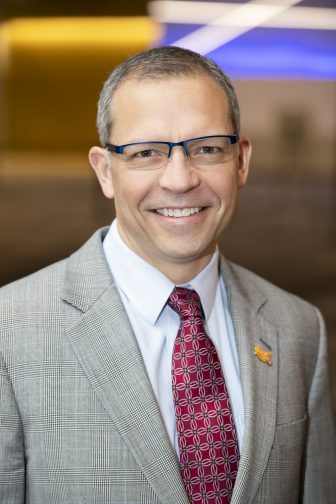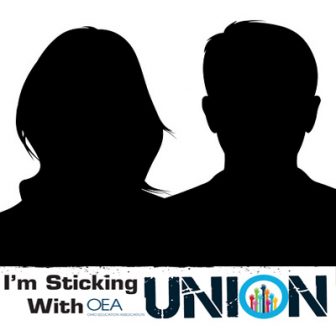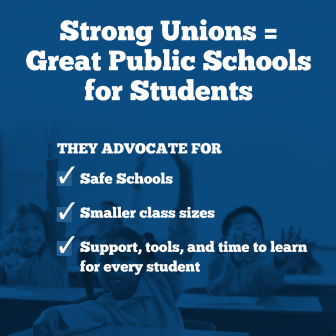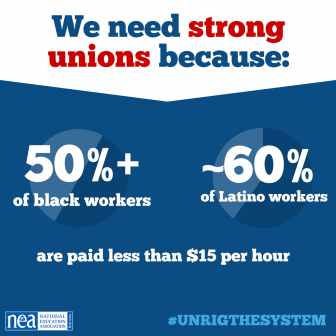April – May 2022 Ohio Schools
- COVER STORY: Prioritizing Student Health – When COVID-19 threatened those under his care, district school nurse David Pryer made sure Allen East students, teachers, and staff could return to school safely
- MAKING THE GRADE
- Oberlin’s Kurt Russell Named Finalist for 2022 National Teacher of the Year
- Association
- OEA to Hold In-Person 2022 Spring Representative Assembly with Virtual Component on May 7
- Candidates of OEA Statewide Election
- Proposed Amendments to the OEA Amended and Restated Constitution and Bylaws Spring 2022
Moved recently? Contact the OEA Member Hotline to update the address on file at 1-844-OEA-Info (1-844-632-4636) or email, membership@ohea.org. Representatives are available Monday-Friday, from 8:30 a.m. to 6 p.m. | OhioSchools — Past Issues

 Oh Yes, We’re Social — Join the Conversation!
Oh Yes, We’re Social — Join the Conversation!
Categories
Communications and Community EngagementEducation Policy and Governing Bodies
Education Support Professional
Higher Education Faculty
Higher Education Staff
Leadership Tools and Documents
Legal Issues
Legislative Issues and Political Action
Membership
New Teacher
OEA Member
Ohio Schools Magazine
Professional Development
Representative Assembly
Retired Member
Student Member
Teaching
Union Business
OEA condemns latest version of House Bill 327
[February 16, 2022] The Ohio Education Association (OEA) stands with the majority of Ohioans who believe all children deserve the opportunity to receive an honest and reflective education that empowers them to become critical thinkers and strong future leaders.
OEA is appalled by the continuing efforts of certain politicians to force through House Bill 327, which would force educators to whitewash our history and distract from the real issues facing Ohio’s schools. OEA calls on the Ohio House of Representatives to end consideration of the bill.
The revisions included in substitute HB 327, as introduced Wednesday, do nothing to address the irreparable harm this legislation would cause to Ohio’s students. And it actually makes the potential dangers to educators and administrators more confusing. The current version replaces the bill’s original and undefinable “divisive concepts” language with vague references to the 1964 Civil Rights Act, apparently requiring Ohio educators to become constitutional law experts in order to understand what the bill’s sponsors don’t want them teaching.
“Make no mistake, this latest version of HB 327 is just another exercise in smoke and mirrors by some state leaders to deflect their constitutional responsibility to fully fund all of Ohio’s public schools and provide Ohio’s children with the resources they need to succeed,” OEA President Scott DiMauro said. “The lawmakers behind this horrendous bill can dress it up anyway they want as they continue to do the bidding of a national network of extremists who are looking to control the political narrative at any cost. But this new version is just as outrageous and inexcusable as the prior version. And in some ways, it’s worse.”
OEA will continue to stand up for honesty in education and against government censorship in the classroom. Ohioans must come together and call on their elected leaders to do better for Ohio’s students.
“Educators and parents know children must have the opportunity to reckon with the mistakes of our past in order to create a better future for all of us,” DiMauro said. “Instead of anti-freedom state censorship laws, let’s work on pro-student policies like fair funding and better access to learning opportunities for all students.”
Backpack Bill would come at enormous cost
“Ohio lawmakers have a constitutional responsibility to fund Ohio’s public schools and ensure a high-quality education for all of Ohio’s kids. HB 290 would force local communities to rely even more heavily on local property taxes to fund schools for the 90 percent of Ohio children who attend public schools. There’s evidence under our current voucher system that public schools out-perform the private schools,” OEA President Scott DiMauro said, citing a Cincinnati Enquirer investigation that found nearly 90% of all voucher students do worse on state tests than students in traditional public schools in the same zip codes.
“Dumping precious resources into a universal voucher system that provides zero auditing requirements for the private schools that would rake in the taxpayers’ cash is just wrong,” DiMauro added. “This is especially true now, when Ohio finally has a public school funding system worth investing in after the adoption of the Fair School Funding Plan in the last state budget. Our lawmakers must hold up their end of the deal to fully fund that system before going off on yet another ideological misadventure with our hard-earned tax dollars. Taxpayers don’t need another ECOT-level disaster and scandal.”
Disturbingly, even with these vouchers, most families still couldn’t afford tuition at the private schools in their communities, and this exponential expansion of a vouchers system in the state would only further contribute to racial segregation in our schools. In Ohio, only about 50% of the subsidies currently being taken are being taken by non-white parents, even though the communities where about 95% of the vouchers come from are nearly 70% non-white. Only 37% of students in Lima City Schools are white, yet Temple Christian School gets $242,000 in taxpayer tuition subsidies and took 100% white students. Likewise, Lima Central Catholic takes more than 70% white students, St. Gerard and St. Charles take about 80% white students. Simply put, these private schools do not reflect the racial makeup of the communities that are forced to pay their bills.
“Ohio taxpayers can’t afford to shell out more money for voucher programs that weaken the public schools that serve the vast majority of Ohio’s kids,” DiMauro said. “We’ve been down this road before and we know it is a dead end in Ohio’s budget. When only 74% of students were eligible for government subsidized private school tuition in 2017’s SB 85, the non-partisan Ohio Legislative Service Commission estimated the cost as high as $1.2 billion. And that was with lower subsidy amounts. This bill will cost (conservatively) two or even three times that amount. Asking Ohioans to pay for that at the expense of their neighborhood public schools is irresponsible and wrong.”
OEA applauds court decision striking down gerrymandered maps
“The Ohio Education Association (OEA) applauds the wisdom of the Ohio Supreme Court in striking down the gerrymandered maps that would have denied Ohioans a real voice in the Statehouse. This is a huge victory for Ohio voters and for Ohio schools, which are greatly impacted by the decisions of the state’s elected lawmakers.
OEA looks forward to seeing newly drawn, fair maps that will reflect the will of the two-thirds of Ohio voters who demanded an end to Ohio’s broken mapmaking process. Ohio voters deserve to choose their politicians, not the other way around. Today’s Ohio Supreme Court decision represents a major step toward making that a reality.”
October-November 2021 Ohio Schools
- COVER STORY: Empowering Students
- 2022 Ohio Teacher of the Year Kurt Russell, a social studies teacher at Oberlin High School, wants his students to be authentic, confident, and know their potential.
- NOTEBOOK
- 2021 NEA Representative Assembly Looks Ahead to New Challenges and Opportunities
- MAKING THE GRADE
- OEA Member Receives National Award for Teaching Excellence
Moved recently? Contact the OEA Member Hotline to update the address on file at 1-844-OEA-Info (1-844-632-4636) or email, membership@ohea.org. Representatives are available Monday-Friday, from 8:30 a.m. to 6 p.m. | OhioSchools — Past Issues

 Oh Yes, We’re Social — Join the Conversation!
Oh Yes, We’re Social — Join the Conversation!
2021-2022 OEA Member Resource Guide
Use this guide as an overview to help you make the most of your OEA Membership. Within, you’ll learn more about:
- Ways to Become Involved
- Fighting for Public Education
- OEA Staff, Leadership, and Board of Directors
- OEA Higher Education Benefit
- Awards and Scholarships
- Valuable NEA Member Benefits and Services
Throughout our more than 150-year history, OEA members have been involved in every struggle and effort to advance the finest of America’s dreams: a quality public education for every child.
If you have additional questions, contact us at 1-844-OEA-Info (1-844-632-4636) or send us an email to: membership@ohea.org.
Moved recently? Contact the OEA Member Hotline to update the address on file at 1-844-OEA-Info (1-844-632-4636) or email, membership@ohea.org. Representatives are available Monday-Friday, from 8:30 a.m. to 6 p.m. | OhioSchools — Past Issues
![]()
![]() Oh Yes, We’re Social — Join the Conversation!
Oh Yes, We’re Social — Join the Conversation!
![]()
President’s Message: Support, Protection, Power

Our Union Helps Us Make Our Students’ Lives Better And Our Communities Stronger
I can’t begin to tell you how much of an honor it is to have the opportunity to serve as your president.
OEA is an incredible organization for two fundamental reasons: who we are, and why we’re here. We have caring, committed, qualified educators in all 88 of Ohio’s counties performing in a wide variety of roles who are united in a single cause—to ensure that every single one of our students is provided a quality public education that inspires their natural curiosity, imagination and desire to learn.
Driven by the desire to foster the critical thinking, problem-solving and decision-making skills my students needed to become effective citizens in our democracy, I became a high school social studies teacher 28 years ago. I didn’t go into education to help kids pass tests, but to create lifelong learners.
I wanted to make a difference, and I know you do too. That’s our purpose. That’s our mission.
That’s why I believe in you and your power to change lives and shape the future. My desire to make a difference naturally led to my active involvement in my local union.
I knew even before my first day of teaching American history at Tolles Technical Center in Plain City I would need the support of my colleagues if I had any hope of success.
That’s why I proudly joined the 45-member strong Tolles Education Association and soon found myself attending Labor- Management Committee meetings and advocating at the bargaining table.
As I continued my career in Worthington and through nearly three decades of activism at all levels of this organization, I have learned that it is only through our union that members are given the support and relationships to necessary to nurture our work with students. It is only through our union that we have the protection and advocacy needed to do our jobs without having to look over our shoulders. And it is only through our union that we are able to harness our collective influence and power to protect public education and improve the lives of our fellow educators and the students we serve.
“I wanted to make a difference, and I know you do too. That’s our purpose. That’s our mission.”
Many colleagues have supported and encouraged me throughout my union journey.
Wendy Nichols, my teaching mentor at Tolles, first invited me to belong to the association and provided me with opportunities to get involved in my local. Kathy Broom, who had been fired early in her marriage and teaching career simply for being pregnant and used the power of her union to successfully win her job back, helped me understand the power of collective advocacy. Suzanne Kaszar, my first OEA Labor Relations Consultant, taught me about bargaining and connected
me to programs to develop my leadership skills.
So many others have made a difference for me because they recognized my leadership potential and provided opportunities for me to play an active role in servingmy fellow members. It began with a simple invitation to belong to a movement that was larger than myself.
If you’re new to your role as an educator or education support professional, or if you have been in the profession for a while but have not yet become a member, I invite you to belong to the OEA and to tap into the support, protection and power your union has to offer.
If you’re returning as a member, I encourage you to be actively involved. Consider following the example Wendy provided to me and invite at least one colleague to join you and feel included. We’re all in this together.
I’m inspired by you and all that you do every day to make our students’ lives better and our communities stronger. You have challenged, nurtured and supported me throughout my union journey, and I look forward to continuing our journey together.
Sincerely,
![]()
Scott W. DiMauro, President
Ohio Education Association
Blog: The Antidote to Despair
By Julie Rine is an English Instructor and an Academic Challenge Advisor at Minerva High School, Minerva, Ohio.
 It’s easy to feel hopeless and overwhelmed right now, isn’t it? The Supreme Court’s decision regarding the Janus case, while not unexpected, still stung. The move by the Court has the potential to weaken unions, many sources say, and the decision has even been referred to as a “crippling blow” .
It’s easy to feel hopeless and overwhelmed right now, isn’t it? The Supreme Court’s decision regarding the Janus case, while not unexpected, still stung. The move by the Court has the potential to weaken unions, many sources say, and the decision has even been referred to as a “crippling blow” .
There are certain unfortunate situations in life that we can’t control, and it’s important to recognize those and let them go rather than devote energy to a state of affairs that cannot be changed.
There are also situations in life that we CAN impact, with our actions, our words, our advocacy, but even in those situations, there are moments when you have to let go, politically, personally, emotionally. You have to take a break, look away, check out, turn off the news and turn on a Friends rerun, lose yourself in a good book, take a few deep breaths and decide to let go and let someone else take up the cause for awhile. Those “let go” moments are critical to maintaining good mental health and restoring energy to jump back into the fray when we are refreshed and ready to go.
But this is not one of those times. This is not a “let go” moment. This is a “Let’s Go” moment.
The media would have you believe that the Janus ruling will lead to fewer union members which means a reduction in funds which equals unions cutting jobs and services and benefits. If you believe the news, soon our teacher unions will be so weak and ineffective that teachers will not be able to influence an impressionable kindergartner, let alone legislative policies.
Don’t believe the hype.
If anyone is equipped to turn a bad roll of the dice into an opportunity to change the game, it’s teachers.
On a daily and weekly basis, we think on our feet, we adapt to a snag in the routine. We reflect on what worked and what didn’t and make adjustments in the three minutes between classes, a task that would take Congress three months. We take on whatever challenges exist in our communities and in our classrooms and we overcome them. We don’t stop there, either. Most of the time, we not only overcome the challenges we face, challenges which can change from year to year and week to week, (sometimes even minute to minute!), we create new programs, new methods, and new realities that are often more effective for our students than what existed before the obstacle presented itself.
I don’t care what your political leanings are, if you are a teacher, you rival only parents in your fierce desire to protect kids and prepare them to succeed in the future.
The union helps us do just that. Through the union, we can fight for what our kids need to succeed, such as smaller class sizes, adequate and up-to-date academic resources, onsite counselors and mental health professionals, and a safe environment in which to learn. The union also helps us fight for what teachers need to help students succeed, such as adequate planning time, meaningful professional development, continued opportunities for further education and training, sufficient time to work as teams to tackle problems rather than as isolated instructors behind our classroom doors, and yes, a fair salary which allows us to focus fully on our students and our own families instead of squeezing in hours away from both while we work a second job to make ends meet. The trickle-down effect here is obvious; when teachers lack support and resources, kids lose the effective education they deserve.
So what can we do?
The decision will not be reversed, and even worse, it appears that a new Justice will be seated who may have equally damaging views of unions and public education.
First, we must remember that Supreme Court Justices are not the only ones allowed to issue opinions. We can write letters to the editor of our local papers, and we can routinely call or write our elected officials to make our voices heard and our opinions known.
Secondly, we can actively recruit members, especially young teachers, to not only join the union, but to become active in the union. Retaining or gaining members will of course help the union financially, since our dues dollars provide us with the resources and training necessary to be effective advocates for our students. But we don’t just need the dues money. We need active and energetic members, more than ever before. Money talks, but members act.
Thirdly, we can help register new voters. If we want a future in which citizens are active participants in the democratic process (whether they are on “our side” or not), then we must emphasize the importance and value of our right to vote, and then take the practical step to register young voters. It is a simple process. There is no reason why every 18-year-old student who graduates from an American high school should not be registered to vote.
 We can’t force them to register, however, so the goal should be to get them excited to register.
We can’t force them to register, however, so the goal should be to get them excited to register.
By teaching our students how to read a variety of sources on any given topic and then to form their own opinion, we help them become critical thinkers. Critical thinkers are often eager to make their positions known, and the most powerful way to do that is to exercise the right to vote. Few moments of my teaching career have been as special to me as when I registered a student to vote and she literally high-fived me and yelled, “I can vote, I can vote!” This is the enthusiasm we must seek to engender in our classrooms.
Perhaps most importantly, we can get involved in local and OEA efforts to elect pro-public education and pro-union candidates. We can work phone banks, canvass door-to-door, talk to our colleagues and friends about why we support certain candidates. We must follow that up by voting for candidates who support us as public school teachers and as union members, up and down the ballot, in local elections, in primaries, in midterms and in presidential elections. These actions are particularly important in Ohio this year, as we will be voting for a senator and a governor.
Political defeats can be discouraging, but nothing feels worse than knowing you could have done more to ensure victory when instead you chose to sit on the sidelines. We must take our frustration and allow it to motivate us to take action.
Sure, the Supreme Court decision is a setback, a challenge to be overcome. But a “blow” to unions? I don’t think so. In fact, I think they might have just poked the beast. Joan Baez said “Action is the only antidote to despair.” So don’t despair. Don’t make this a “let go” moment. This is a “LET’S GO!” moment and I have no doubt that we will persevere and succeed. The teachers’ unions are strong because teachers are strong, and we are stronger when we stand together, as friends, as colleagues, and as proud union members.
![]()
— Julie Rine is an English Instructor and an Academic Challenge Advisor at Minerva High School, Minerva, Ohio.
You Cannot Silence the Voice of Working People

Teaching children is pretty wonderful.
This has been my passion and in the 19 years that I taught, I learned from and have been inspired by my colleagues. I have also been moved by the actions of fellow union members who fought for better wages and safe working conditions.
The energy we are seeing with teachers standing up in the neighboring states of West Virginia and Kentucky and elsewhere as the #RedForEd movement spreads across the country is unparalleled in recent history. Public opinion is with us. A recent poll found that 62% of Americans believe the country is better off with stronger unions.
Yet, while this happening, amid the highest level of support for unions in 15 years, the US Supreme Court in a narrow 5-4, politically-motivated decision ruled that unions – specifically public employee unions — should be weaker. The Supreme Court ruled in the case of Janus v. AFSCME, Council 31 to further tilt the playing field in favor of the wealthy and corporate interests.
The court overturned 40 years of precedent in deciding that requiring so-called fair-share fees to be paid by people who choose not to join a public-sector union but who enjoy the benefits of union representation somehow violates the First Amendment of the Constitution. This doesn’t make sense, and it’s not right.
It also doesn’t make sense that so many people are finding it difficult to get by and provide for their families, no matter how hard they work. It doesn’t make sense that people are more productive than ever, but they’re working longer hours for less money and fewer benefits. And it doesn’t make sense that all this is going on while a handful of very wealthy people have seen their salaries and holdings skyrocket. It is shameful that the wealthy special interests behind the Janus case have succeeded in manipulating the highest court in the land to do their bidding.
"I believe deeply in the power of our collective voice to make sure that every teacher and student has the resources they need to be successful."

I believe deeply in the power of our collective voice to make sure that every teacher and student has the resources they need to be successful. When unions negotiate for working conditions in the classroom, they also negotiate for the conditions in which our children learn. When our unions advocate for us as educators, they also advocate for the students we serve.
Public service workers-teachers, social workers, firefighters, and nurses are more determined than ever to stick together in their unions. Unions remain the most effective vehicle for the power in numbers needed for working people to secure their rights and freedoms, and they provide a pathway to the middle class.
The truth is, when unions are strong, the entire community benefits. Unions use their collective voice to advocate for policies that help all working people — like increases to the minimum wage, affordable health care and great public schools.
Unions help close the pay gap for women and communities of color who have been systematically disadvantaged due to discrimination and prejudice.
African-American women in unions earn an average of $21.90 per hour, while non-union women earn $17.04. When Latinos are members of a union, their median weekly income increases by more than 38 percent.
The wealthy special interests that have benefited from an unfair, unbalanced playing field are now intent on tilting that playing field even more by attacking public-sector unions.
It’s driven by ideological extremists who oppose our basic right to organize. And it’s an attack on more than the men and women who are teachers and custodians and first responders; it’s an attack on anyone who wants to use their voice to fight for something better for their communities.
I have dedicated my life both to helping students and fighting for my community and I won’t back down.
My fellow educators and I are going to continue to speak out and I ask those who feel the same, please join us. Because no great social change — from ending slavery to securing the right to vote for every citizen, to winning the freedom to organize — has been achieved by standing alone.

Becky Higgins
President
Ohio Education Association
Categories
2018 Press ReleasesAbout Voices of Change
Education Support Professional
Higher Education Faculty
Higher Education Staff
Legislative Issues and Political Action
Local Leader
Member Stories
Membership
New Teacher
Non-educator
OEA Member
preK-12 Teacher
Retired Member
Student Member
What's New
Stand Strong for Public Education…Together, We Can!
 Janus v. AFSCME?
Janus v. AFSCME?
Through our union, we advocate for what our students deserve and for what educators need to do our jobs well. However, the U.S. Supreme Court will likely issue a decision in the case this week that could threaten our collective voice. Janus v. AFSCME is a politically motivated attack to use the U.S. Supreme Court to divide and conquer our union by eliminating the fair share fee.
Why Does It Matter
Janus v. AFSCME is part of a concerted effort to weaken our ability to advocate for our students and members. Negotiating collectively improves the lives of all working people—even those who are not union members themselves—because strong unions set pay and benefit standards that non-union employers follow. This means stronger communities. At its core, the Janus case is about working people’s freedom to make a better life for themselves, their families, and their communities.
What Are We Doing About It?
Together, we are continuing the fight for strong public schools by strengthening our locals and demonstrating value and relevance to our members. | #OEAstrong
Download the Strong OEA = Strong Public Schools fact card for additional details about Janus v. AFSCME.
![]()
 Oh Yes, We’re Social — Join the Conversation!
Oh Yes, We’re Social — Join the Conversation!
![]()


